Table of Contents
- Construction & Clean Out Job Dumpsters
- Deciding What Dumpster Is Right For You
- Roll Off Dumpsters
- Commercial Dumpsters
- Waste And Recycling Contract
- Larger Sized Dumpsters
- Compactors
- Residential Collection
- Who Is Priority Waste?
Construction and Clean Out Job Dumpsters
What size or type of roll-off dumpster rental is best for me?
There are a few factors that play into answering what size open top dumpster rental is right for you. Three things that are important to consider when making the decision are:
- What is the job site space?
- What type of waste material will you be dumping?
- When will the container delivery take place?
Job site space:
The first thing to do when deciding which dumpster rental is best for you is take a look at the site where the job will be taking place. It is important that the job site has adequate space for the dumpster, so prior to ordering make sure you do the following:
Look at the dumpster dimensions we offer to make sure the dumpster you order properly fits in the space provided.
Look above the job site space. Are there any overhead wires or low branches? A rolloff dumpster has to go approximately 30 feet up in the air to roll down onto your driveway.
It is important that you carefully scope out your dumpster placement to avoid any damage or complications! Remember, waste management companies are not liable for driveway damage or surrounding damage such as overhead wires.
Waste material you are putting in the dumpster:
There are several regulations regarding what can and can’t go inside your dumpster and it is very important that you make note of them. These rules are put into place for safety concerns, environmental purposes and legal road weight limits. Failure to follow these rules will result in additional charges to your credit card as well as putting your safety at risk.
Container delivery:
In terms of timing, it is always best to plan ahead. If you know you will be needing a dumpster by a certain date, it is recommended to call a few days earlier to reserve a dumpster and schedule a delivery. However, we understand that things happen. That is why if you are in a pinch, Priority offers same day delivery service. With that being said, we can not 100% guarantee a dumpster at last minute due to availability, drivers, and time of day, but we will always do our best to make it happen for you.
While we can rush a dumpster to you within 24 hours or less, our typical hours of operation are Monday thru Friday, and Saturday deliveries with an advanced notice.
Deciding What Dumpster Is Right For You
When looking into dumpster rental, the first thing to consider is what dumpster is right for you. Most people don’t know this, but there are different dumpsters for different purposes. It is important to understand the differences at an early stage to ensure you are getting the right dumpster for your project.
The two common types of dumpsters are Roll Off Dumpsters and Commercial Dumpsters.
Roll Off Dumpster:
A temporary roll off dumpster is meant to be rented for one time projects, such as a remodel or renovation.
Examples of roll off dumpster rental projects:
- Garage clean outs
- Residential projects
- Roofing jobs
- Remodeling
- Construction
- Site usage at plants
Roll off dumpster sizes:
- 10 Yard
- 20 Yard
- 30 Yard
- 40 Yard
Commercial Dumpster:
A commercial dumpster is used for regular trash collection at a business.
Examples of commercial dumpster rental projects:
- Offices
- Restaurants
- Retail space
- Salons
- Gas stations
- Warehouses
Commercial dumpster sizes:
- 2 Yard
- 4 Yard
- 6 Yard
- 8 Yard
Is there anything I can’t put in my dumpster?
YES. Something most people are not aware of is that there are different rules for what can go inside these two containers. For safety reasons, there are some items we cannot accept in our dumpsters. These include any items containing hazardous chemicals that could harm the landfill or our containers. Read about what you can and cannot put in your dumpster in the next chapter or if you are unsure about an item, you can always give us a call and talk to a Priority customer service representative at 855-WASTE-65.
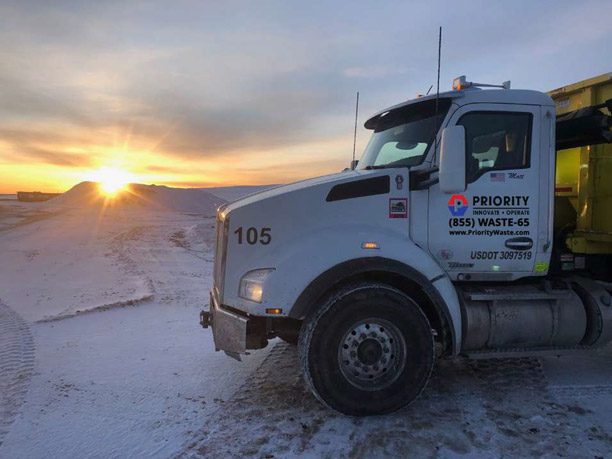
Roll Off Dumpsters
Acceptable materials in roll off dumpsters
So far we’ve talked about the sizes and types of dumpster customers order from their local waste management firms. Now let’s discuss the material types you can toss in them.
What can I put inside my dumpster?
Depending on which container you have (roll off vs commercial) there are different rules on what can go inside your dumpster. For this chapter we will be discussing a roll off container, which is rented for one time projects such as a remodel whereas a commercial dumpster is used for regular trash collection at a business.
What is ALLOWED in a roll off dumpster?
Household junk Remodeling debris Yard waste Shingles
Concrete, asphalt & brick
Note: While you can toss most common items in a roll off dumpster rental it is important to note that there are often regulations on what can be mixed in the same container. If you are planning to use your dumpster for multiple projects at a time, call 855-WASTE-65 and our customer service representatives will assist you in making sure you are staying safe and following regulation.
What is NOT ALLOWED in a roll off dumpster?
Prohibited items: Regulations apply. Might be different for participating locations. If you have questions or hesitations, always call ahead.
- Fuels
- Oils
- Batteries
- Paint
- Medical Waste
- Asbestos
- Industrial Drums
- Contaminated Absorbents Food Wastes
- Inks
- Adhesives
- Resins
- Refrigerators
- Air Conditioners
- Hot Water Tanks
- Tires
- Railroad Ties
Note: It is important to note that certain items are not allowed in a dumpster for your own safety as well as environmental reasons. Certain items must be handled separately from other items, using special equipment and following protocol. If you need disposal for any prohibited items on the list, we can help. Call 855-WASTE-65 to learn how to get rid of prohibited trash items that can’t go inside a dumpster.
What Size Roll Off Dumpster Does My Company Need:
*Dimensions may vary slightly based upon container manufacturer specs.
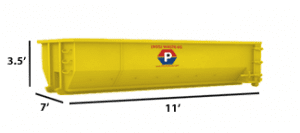
10 Yard Dumpster
Smallest dumpster that takes up the least amount of space. Commonly used for:
- Garage clean outs
- Small residential projects
- Heavy materials such as clean concrete
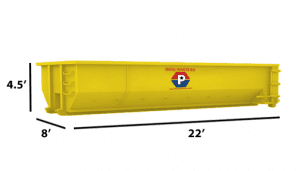
20 Yard Dumpster
Convenient and easy to load, these dumpsters are commonly used for:
- Small to mid-sized residential or commercial projects
- Roofing jobs
- Demolition jobs
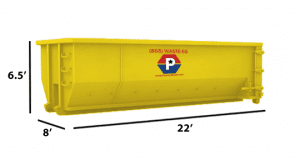
30 Yard Dumpster
Commonly used for:
- Medium-to-large projects
- Perfect for residential construction and remodeling projects
- Light industrial cleanups
- Permanent site use or long-term projects and manufacturing facilities
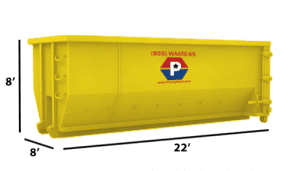
40 Yard Dumpster
The largest of the roll off dumpsters. Commonly used for:
- Commercial/industrial construction
- Permanent site usage at plants
Commercial Dumpsters
Acceptable materials in commercial dumpsters
So far weve talked about the sizes and types of dumpster customers order from their local waste management firms. Now let’s discuss the material types you can toss in them.
What can I put inside my dumpster?
Depending on which container you have (roll off vs commercial) there are different rules on what can go inside your dumpster. For this chapter we will be discussing a commercial container which is rented for regular trash collection at a business.
What is ALLOWED in a commercial dumpster?
- General Trash
- Food Waste
- Packaging Materials
- Office Supplies
Note: You can put most common trash inside a commercial dumpster. When you set up your dumpster service with Priority, you want to make sure you choose an appropriate bin size and trash collection schedule to prevent your container from filling up before you next pickup. See what bin sizes will fit your companies waste removal needs by following the general guidelines on the next page.
What is NOT ALLOWED in a commercial dumpster?
Prohibited items: Regulations apply. Might be different for participating locations. If you have questions or hesitations, always call ahead.
- Fuels
- Oils
- Batteries
- Paint
- Medical Waste
- Asbestos
- Industrial Drums
- Liquid Chemicals
- Appliances
- Construction
- Remodeling & Roofing Materials
- Concrete
- Brick
- Dirt & Asphalt
- Tires
Note: Your commercial dumpster is the right place for majority of the trash your business is going to produce however, some restrictions do apply. For safety reasons, no hazardous items or bulky items are allowed in the dumpster. If you are unsure about an item you need disposing of, call Priority at 855-WASTE-65 and we will happily help you with your business waste removal question.
What Size Commercial Dumpster Does My Company Need:
*Dimensions may vary slightly based upon container manufacturer specs.
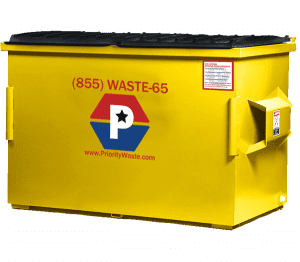
2 Yard Dumpster
6’2″ wide x 3’7″ high x 3’5″ deep
(available on wheels)
Our smallest container that takes up the least amount of space. Commonly used for:
- Small offices
- Small retail & salons
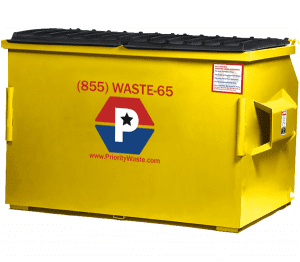
4 Yard Dumpster
6’2″ wide x 5’4″ high x 4’7″ deep
(available on wheels)
Commonly used for:
- Mid-sized restaurants & gas stations
- Small to medium retail spaces
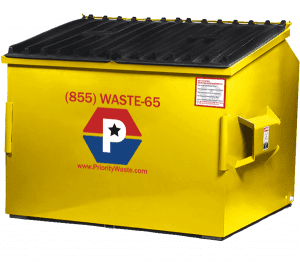
6 Yard Dumpster
6’2″ wide x 5’3″ high x 6’1″ deep
(slant format)
6’2″ wide x 4’11” high x 6’1″ deep
(square format)
Commonly used for:
- Grocery stores
- Chain Restaurants & Apartments
- Large Retail Spaces
- Available with side doors in square format upon request
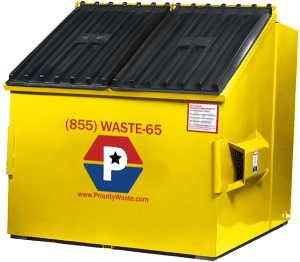
8 Yard Dumpster
6’2″ wide x 6’3″ high x 6’9″ deep
(slant format)
6’2″ wide x 6’8″ high x 6’1″ deep
(square format)
Commonly used for:
- Warehouses
- Large Restaurants
- Manufacturing Facilities
- Available with side doors in square format upon request
Scenario:
You are a restaurant owner. You are just about to have your health department inspection before your grand opening and of course, a dumpster is needed. Choosing the right dumpster for any type of commercial business can be intimidating to those who have been burned in the past by fuel surcharges, unreasonable price hikes, or other games played by large waste management companies.
For grand openings, don’t be afraid to start out with an eight or six yard dumpster. If business slows down or steadies, you can always reduce the number of weekly pickups or dumpster size.
Always look up to be sure there is plenty overhead clearance if you are using a front load dumpsters. If you are in a tight alley, consider a 4 yard dumpster on wheels. Whatever size is selected, even if smaller, can always be maximized with the number of dumps per week. Most waste and recycling companies service up to six times per week, Monday through Saturday.
If you are utilizing heavier materials, go with a smaller size even if you have to get more pickups. The last thing you want is to fill an 8 yard dumpster all the way up with something such as heavy glass, which will potentially cause the forks on a front load truck to snap off or cause the dumpster to fall on top of the truck, assuming the forks are even able to lift the dumpster. Be mindful of safety when choosing the right dumpster for your business. Allow approximately 1 week for these permanent dumpster deliveries, and be sure to understand your contract terms.
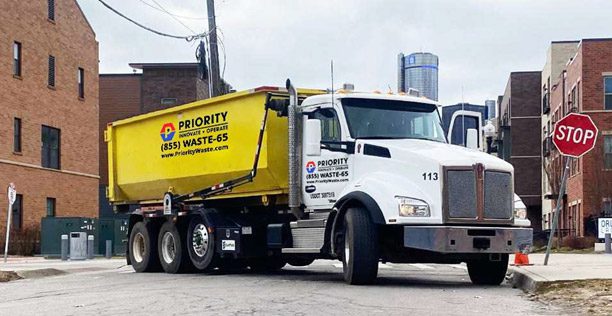
Waste & Recycling Contract
When renting a dumpster for your business, it is important to understand what you are signing. Most waste companies refer to contracts as “service agreements.”
Just about every service agreement for dumpster rentals has a waiver of liability for pavement or surrounding area damage. It is important to appreciate this is effectively a semi driving across your parking lot or driveway. There is a foreseeable risk that it could cause cracks or other damage to your pavement, so be sure it is sufficiently paved to bear the weight of the truck and any equipment such as the dumpster itself, including its contents.
Service agreements also hold the waste management company harmless of any illegal liquids or other hazardous materials people sometimes try to slip into a dumpster. Proper disposal is key to renting a dumpster for the right purposes.
Fuel Recovery Fees or other fees are often a battle in negotiating contracts with waste companies. Be sure you and your sales rep are clear in understanding annual price increases and any additional fees such as fuel recovery fees.
Finally, understand your terms. The length of the contract is often negotiable depending on the size of the account. Many states allow for automatic renewal clauses, which are often necessary because there has to be a continuation of contract when an initial term expires. A dumpster is often a permanent fixture to a business, so nobody wants their dumpster disappearing on its expiration date because a customer forgot to renew the contract. Understand the length of not just your initial term, but your renewal term and when it renews.
Very few, if any, waste companies will rent a dumpster, whether it’s front load or roll-off, without some form of agreement being signed in person, via fax, digitally or via some other method of communication. We are no exception and we encourage you to understand your terms and conditions.
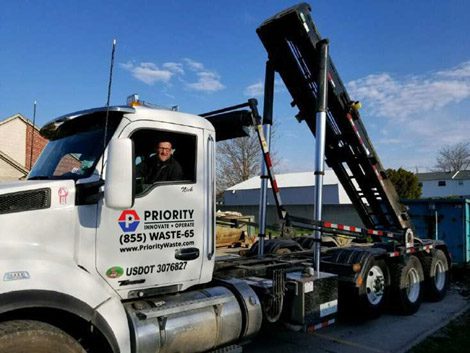
Larger Sized Dumpsters
Bigger isn’t always better. In America, we have that tendancy to order “LARGE” as a knee-jerk reaction. But this isn’t the right decision to always make when renting dumpsters, whether they be roll off or commercial dumpsters.
Let’s start with commercial (front load) dumpsters. A manufacturing facility we knew of once had the large 8 cubic yard dumpster picked up one time per week. One week they decided to load it with glass jars full of juice, which is very heavy material, especially if it gets rained on absorbing water weight also. Soon after taking delivery of this large dumpster, a truck went to service the site. The forks of the truck snapped while it had the bin overhead and the dumpster landed on top of the truck. Luckily it did not fall through the windshield. It’s a wonder the forks were even able to lift this bin. What would a better solution have been? How about a 2 cubic yard dumpster serviced 4 times per week? It’s still 8 cubic yards per week; however, because of the smaller bin, it is lighter to lift when done more frequently. Sure the pricing would be closely competitive and the customer would be avoiding liabilities in injuring the driver and/or its own bystanders on staff. An invoice for a smaller bin is far less than an invoice for damages to a quarter-million dollar piece of trucking equipment.
Now let’s talk about rolloff dumpsters, especially 40 cubic yard containers. These disposal units are massive and often erroneously ordered. They were designed more for permanent facilities, such as industrial plants recycling bulky packaging and cardboard or disposing of bulky light waste materials. Construction companies started to love them, though, not all of these customers knew how to properly use them, unfortunately. Yes, they often save having to order an additional dumpster by going “LARGE”, but what happens whey they are filled with concrete and too heavy to lift? Typically a waste company charges a “false trip” or “dry run” fee in such instances, then asks that you
order that second dumpster anyway to off-load half the overweight material into, so not only have you paid a false trip hauling fee, but also paid for another dumpster. Do it right the first time around, if it’s heavy, stick to about a 10 cubic yard dumpster. Materials such as dry wall or dirt should also avoid being put in 40 cubic yard dumpsters, especially in rainy climates as they absorb water and become heavier.
Finally, just because a truck can hoist the dumpster onto its back, keep in mind local road restrictions and weight laws. The last thing you want is for the truck to be able to pick it up, haul it, then send you a ticket from the police for overweight axles via an invoice. Remember, these are customer liabilities.
Ask your waste and recycling rep what dumpster will work best for your materials and be honest about the material being disposed of to avoid troubles such as the aforementioned instances!

Compactors
How do you know when the time has come to consider a compactor? There are a few instances where compactors are generally used. Most commonly, compactors come in to play when volume is involved. Volume could entail multiple dumpster users, for instance, at a shopping plaza. Volume could also mean a warehouse that currently has several dumpsters all going daily that just don’t seem to be enough to keep up with the trash or recycling overflow.
In such instances, a trash compactor can save you money by reducing the number of “pulls” needed on your dumpster. Less pulls mean less trips by a garbage truck, which costs you less money.
Compactors come in all kinds of shapes and sizes. What are they? Basically, dumpsters with hydraulic machinery that crush waste material to a smaller size. There are front load rear and roll off applications to suit your needs. For restaurants, grocery stores or any other types of applications involving “wet waste,” be sure you go with a “self- contained unit.” These sealed compactors prevent seepage or other messy situations, which could later lead to odor and rodent issues. “Stationary” compactors, which are not self-contained, are often times cheaper, and are great for “dry waste” materials, such as manufacturing plant trash or cardboard/plastics recycling. Self-contained units usually also cost more to service as they are usually heavier, and sometimes require “round tripping” because the container is attached to the machine.
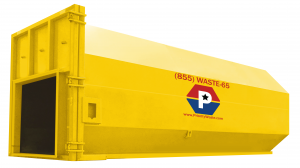
Garbage Compactor
Most compactors can be rented, leased-to-own and/or outright purchased by customers. Each have advantages. Renting usually means you’re never responsible for the maintenance on the machinery. Leasing usually offers a cheap buyout after a few years, so you no longer have to pay a monthly fee, but typically pick up the maintenance tab after approximately a year. Outright purchases often come with a warranty (usually a year) and allow more flexibility in selecting haulers as you’re never going to pay an installation fee twice if you switch companies; however, be sure you educate yourself on proper compactor maintenance, especially after the warranty expires.
Compactors also often have need options in today’s advanced technological world. For example, some offer monitoring units, so when the compactor is full, it automatically faxes or emails your waste company to come dump it so your crew never miss the “full light” alerting them to call it in manually. For plazas, some compactors also offer usage swipe cards, so landlords can bill their tenants based on usage. These are common at large shopping malls especially where landlords issue swipe cards to tenants and charge them per swipe. Some landlords actually make money on their tenants’ trash removal with these monitoring and usage devices in creative situations. Compactors are a great alternative, but be sure you NEED one before you get one.
Residential Collection
Consider Priority for your community’s next trash, recycling, and compost bid!
In addition to dumpster rentals, we also offer residential collection services.
We offer garbage, recycling and compost pick up for:
- Municipalities
- Subdivisions
- Mobile Home Communities
- Condos
- Townhouses
Don’t see what you are looking for? Call 855-WASTE-65 to learn more about how you can switch to Priority Waste’s residential collection services today!
Who Is Priority?
- Priority was created by individuals, who recognized a customer service problem in the waste industry, and took action to improve it.
- Our staff is continually seeking new ways to evolve and grow the business, without losing sight of the #1 priority, the customer experience.
- Our executives do not hide. They offer all community leaders direct access to them, both at the office and on their personal cell phones.
- No matter how big Priority grows, we will always be a local company. When you call the office, you will speak to a real person ready to assist you.
- Priority actively supports the community through its participation in numerous charitable events.
- Cleanliness is the only option. You can rest assured that your streets, businesses, and neighborhoods will be taken care of with that same mindset.
- PEOPLE come before PROFIT.